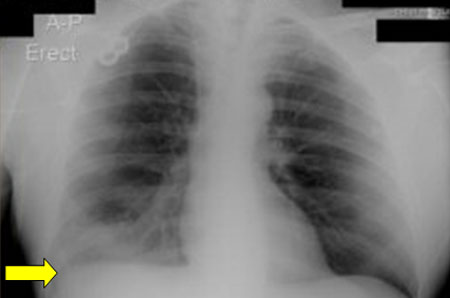Resumo
Definição
História e exame físico
Principais fatores diagnósticos
- presença de fatores de risco
- pessoa conhecida com Legionella
- febre
- cefaleia
- estertores/roncos
Outros fatores diagnósticos
- tosse produtiva
- dispneia
- náuseas/vômitos
- dor abdominal
- hipóxia
- taquicardia
Fatores de risco
- abastecimento de água não municipal
- reparo recente em encanamento residencial
- tabagismo
- quimioterapia citotóxica
- receptor de transplante de pulmão
- corticosteroides
- aquecedor de água elétrico
- trabalhar >40 horas por semana
- viagem recente
- diabetes mellitus
- motorista profissional
- uso de banheiras de hidromassagem
- morar próximo a uma torre de resfriamento
- nebulizadores, umidificadores, tubos de ventilação ou equipamentos de lavagem com água da torneira
- alta proximidade de fontes de água decorativas
- consumo de gelo contaminado por Legionella pneumophila
- parto na água
- exposição a compostagem contaminada
- exposição à água da chuva
Investigações diagnósticas
Primeiras investigações a serem solicitadas
- Hemograma completo
- perfil metabólico completo
- radiografia torácica
- TC abdominal
- detecção de antígeno urinário de Legionella pneumophila do sorogrupo 1
- coloração de Gram de expectoração
- culturas
Investigações a serem consideradas
- reação em cadeia da polimerase (PCR) para Legionella pneumophila
- sorologia para Legionella pneumophilia
Algoritmo de tratamento
pneumonia leve/moderada por Legionella
pneumonia por Legionella grave ou ausência de resposta à terapia inicial
Colaboradores
Autores
Forest W. Arnold, DO, MSc, FIDSA

Professor of Medicine
Division of Infectious Diseases
Department of Medicine
School of Medicine
University of Louisville
Louisville
KY
Declarações
FWA has received grants from the National Institutes of Health, Health Resources and Services Administration, as well as Pfizer, Covarsa, Merck, and Gilead pharmaceutical companies.
Agradecimentos
Dr Forest W. Arnold would like to gratefully acknowledge Dr Allen Griffin, a previous contributor to this topic.
Declarações
AG declares that he has no competing interests.
Revisores
Victor L. Yu, MD
Professor of Medicine
University of Pittsburgh
Pittsburgh
PA
Declarações
VLY declares that he has no competing interests.
Créditos aos pareceristas
Os tópicos do BMJ Best Practice são constantemente atualizados, seguindo os desenvolvimentos das evidências e das diretrizes. Os pareceristas aqui listados revisaram o conteúdo pelo menos uma vez durante a história do tópico.
Declarações
As afiliações e declarações dos pareceristas referem--se ao momento da revisão.
Referências
Principais artigos
Phin N, Parry-Ford F, Harrison T, et al. Epidemiology and clinical management of Legionnaires' disease. Lancet Infect Dis. 2014 Oct;14(10):1011-21.Texto completo Resumo
Centers for Disease Control and Prevention. CDC Yellow Book 2024: health information for international travel. Section 5: travel-associated infections & diseases (bacterial) - legionnaires' disease & pontiac fever. May 2023 [internet publication].Texto completo
US Centers for Disease Control and Prevention. Legionella (Legionnaires' disease and pontiac fever): diagnosis, treatment, & prevention. March 2021 [internet publication].Texto completo
Metlay JP, Waterer GW, Long AC, et al. Diagnosis and treatment of adults with community-acquired pneumonia. An official clinical practice guideline of the American Thoracic Society and Infectious Diseases Society of America. Am J Respir Crit Care Med. 2019 Oct 1;200(7):e45-67.Texto completo Resumo
Artigos de referência
Uma lista completa das fontes referenciadas neste tópico está disponível para os usuários com acesso total ao BMJ Best Practice.

Diagnósticos diferenciais
- Doença do coronavírus 2019 (COVID-19)
- Pneumonia bacteriana
- Pneumonia hospitalar
Mais Diagnósticos diferenciaisDiretrizes
- Pneumonia in adults: diagnosis and management
- Infectious Diseases Society of America/American Thoracic Society consensus guidelines on the management of community-acquired pneumonia in adults
Mais DiretrizesCalculadoras
Índice de gravidade de pneumonia adquirida na Comunidade (PSI) para adultos
Escore CURB-65 de gravidade de uma pneumonia.
Mais CalculadorasConectar-se ou assinar para acessar todo o BMJ Best Practice
O uso deste conteúdo está sujeito ao nosso aviso legal